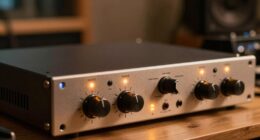Pursuing a music education requires a significant investment of time, money, and dedication. You'll need to weigh the time commitment, typically at least three years, and costs, ranging from a few thousand to tens of thousands of dollars per year. But, you can explore alternative paths, like online resources and collaborations, to gain practical experience and build a diverse portfolio. Defining your career goals and needs will help you decide if a music degree is necessary. By understanding your personal objectives, evaluating financial options, and leveraging online resources, you'll be well on your way to achieving your music aspirations. Now, take the next step to uncover more.
Key Takeaways
- Define your career goals and assess if a music degree is necessary for your desired role in the industry.
- Research and explore alternative paths in music education, including online resources and practical experience.
- Create a financial plan, considering costs, scholarships, and part-time work to support your education.
- Build a strong online portfolio, showcasing your musical abilities and creativity to attract opportunities.
- Network and seek guidance from industry professionals to gain practical skills and insights.
Weighing Time Commitment and Costs
When contemplating enrolling in a music school, it's important to take into account the significant time commitment and costs involved in pursuing a degree in music. Typically, completing a Bachelor's degree in music takes at least three years, requiring a substantial investment of your time and energy.
Furthermore, the costs of attending music school can vary widely, ranging from a few thousand to tens of thousands of dollars per year. It's vital to factor in additional expenses, such as instrument purchases, sheet music, private lessons, and performance attire, which can add up quickly. These costs can be overwhelming, but don't let them discourage you. Scholarships, grants, and financial aid options are available to help offset the expenses.
Additionally, you can consider part-time work or freelance music gigs to supplement your income while attending school, making it more manageable to meet your financial obligations. By carefully weighing the time commitment and costs, you can make an informed decision about pursuing your musical aspirations.
Exploring Alternative Paths to Success

As you consider your music education, you may find that traditional music school isn't the best fit for you.
Luckily, there are many non-traditional learning paths and unconventional career choices that can lead to success in the music industry.
Non-Traditional Learning Paths
What if the traditional music school route isn't for you – can you still achieve success in the music industry through alternative means? The answer is yes.
A non-traditional approach to music education can be just as effective, if not more so, than a traditional music school route.
Here are some alternative paths to consider:
- Online resources: Take advantage of free online resources that offer valuable knowledge in music theory, production, and marketing. These resources can provide a solid foundation for your music education.
- Collaborations and projects: Gain practical experience by working with other musicians on collaborations and projects. This hands-on approach can help you develop your skills and build your network.
- Diverse portfolio: Focus on building a diverse portfolio that showcases your musical abilities and creativity. This will be essential in establishing your music career.
- Feedback and networking: Seek feedback on your work from online communities and mentors, and network with industry professionals to gain exposure and opportunities in the music industry.
Unconventional Career Choices
Beyond the spotlight of traditional music stardom, you can forge a successful and fulfilling career in the music industry through unconventional career choices that play to your unique strengths and interests. One such path is community music, where you can work with local organizations, schools, or non-profits to bring music to underserved communities. This path not only gives back to the community but also provides a sense of purpose and fulfillment.
Here are some unconventional career choices to consider:
| Career Path | Description | Required Skills |
|---|---|---|
| Music Therapist | Use music to help individuals with physical, emotional, or cognitive disabilities | Music theory, psychology, communication |
| Music Journalist | Write reviews, interviews, and features for music publications | Writing, critical thinking, industry knowledge |
| Music Educator | Teach music in schools, colleges, or private institutions | Music theory, pedagogy, communication |
| Sound Designer | Create sound effects and music for film, TV, and video games | Audio production, sound design, creativity |
| Music Producer | Oversee the production of music recordings, from planning to post-production | Music theory, production techniques, project management |
These careers may not be as glamorous as being a rockstar, but they offer a sense of fulfillment and stability. By exploring these alternative paths, you can find a career in music that aligns with your passions and skills.
Understanding Career Goals and Needs

You'll greatly enhance your chances of success in the music industry by pinpointing your ultimate career goal, whether it's to perform on stage, educate the next generation, compose chart-topping hits, or produce Grammy-winning albums. Defining your career goals will help you determine the best path forward, including whether a music degree is necessary to achieve your aspirations.
To get started, consider the following:
- Align your degree with your career aspirations: Will a music degree help you achieve your career goals, or are there other routes you can take?
- Evaluate your personal needs: What're your financial resources, time commitment, and learning preferences?
- Research music programs: Look into the specific programs, faculty expertise, and resources available at different music schools to meet your career needs.
- Seek industry guidance: Talk to current professionals in the music industry to understand the practical skills and knowledge required for your desired career path.
Building a Music Portfolio Online

Establishing a robust online presence through a professional website or portfolio is essential for aspiring musicians, as it provides a centralized hub to showcase their music, performances, and achievements to a global audience. This online portfolio serves as a digital resume, allowing music schools and industry professionals to easily access and evaluate your work.
To build a thorough online portfolio, consider the following strategies:
| Platform | Purpose |
|---|---|
| Website/Portfolio | Centralized hub for music, performances, and achievements |
| SoundCloud | Share music and engage with a wider audience |
| YouTube | Visual showcase of performances and music videos |
| Behind-the-scenes insights and personal connections |
Additionally, collaborating with other musicians and producers online can expand your network and create diverse music projects. Participating in online music challenges, contests, and virtual concerts can also provide valuable exposure and connections with industry professionals. Seeking feedback from online music communities, forums, and critique groups can help improve your craft and provide valuable insights for growth. By building a strong online presence, you can increase your visibility and attractiveness to music schools and industry professionals.
Networking in the Music Industry

As you navigate the competitive music industry, your ability to network effectively can make all the difference in opening doors to new opportunities, collaborations, and career advancement. Music school provides a prime environment to build connections with industry professionals, peers, and potential collaborators. By attending music school, you'll have access to networking events, workshops, and conferences that offer valuable chances to meet key players in the industry.
Here are some ways music school can help you network:
- Attend industry events, workshops, and conferences to meet professionals and learn about new trends and opportunities.
- Take advantage of guest speakers and alumni connections to build relationships with experienced musicians and industry experts.
- Utilize online platforms and social media to connect with other musicians and industry professionals, expanding your network beyond school.
- Build relationships through networking, which can lead to potential career opportunities, collaborations, and mentorships.
Free Online Resources for Music Education

Utilizing free online resources can supplement your music education, providing access to a wealth of knowledge and instruction from industry experts and renowned institutions. These resources can help you learn music theory, composition, and production, among other aspects of music education.
| Platform | Resource Type | Focus |
|---|---|---|
| Coursera, Udemy, Berklee Online | Courses | Music theory, composition, production |
| YouTube, Skillshare | Tutorials | Music theory, composition, production |
| Open Music Theory | Interactive textbooks | Music theory |
| Library of Congress | Online collection | Music resources, materials |
You can take advantage of online courses from platforms like Coursera, Udemy, and Berklee Online, which offer free or low-cost music courses. Additionally, YouTube and Skillshare provide tutorials on music theory, composition, and production. Open Music Theory offers free, interactive textbooks and resources for learning music theory. The Library of Congress also provides access to a vast collection of music resources and materials online. Furthermore, online forums like Reddit's r/musictheory and r/WeAreTheMusicMakers offer communities for sharing knowledge and asking questions about music education. By leveraging these free online resources, you can enhance your music education and gain a deeper understanding of music theory and other aspects of music.
Gaining Practical Music Experience

To take your music education to the next level, you'll need to get hands-on experience, and participating in ensembles, attending music workshops, and seeking performance opportunities are just a few ways to do so.
Studying music in a theoretical sense is essential, but it's equally important to apply your knowledge in real-world settings.
Here are some ways to gain practical music experience:
- Participate in ensembles: Join bands, orchestras, or choirs to develop your collaboration skills and learn from others.
- Attend music workshops and masterclasses: Learn from industry professionals and expand your musical knowledge in a short, intensive period.
- Seek performance opportunities: Look for local venues, events, and competitions to showcase your talent and receive feedback from audiences.
- Collaborate with other musicians: Work with composers, songwriters, and other musicians to broaden your musical horizons and develop your creativity.
Assessing Personal Goals and Finances

When contemplating attending music school, it's crucial to establish financial priorities and identify your personal objectives.
You must determine what you aim to accomplish in your music career and evaluate if a music school can assist you in achieving those goals. Consider whether the programs offered align with your specific aspirations, whether it’s performing, songwriting, producing, or teaching. It’s important to ensure that the institution provides the resources, mentors, and environment you need to learn effectively at music school. Ultimately, the right fit will empower you to grow both creatively and professionally.
Set Financial Priorities
Set Financial Priorities
Regularly evaluating your financial situation is essential to determine how much you can realistically invest in music school without breaking the bank. You need to assess your income, expenses, and savings to create a realistic budget that covers tuition, instrument expenses, books, and living costs.
To set financial priorities, consider the following:
- Research financial aid options: Look into scholarships, grants, and financial aid packages offered by the music school or external organizations.
- Explore alternative funding sources: Part-time work, crowdfunding, or music-related competitions can help alleviate the cost of tuition and expenses.
- Prioritize your spending: Allocate your funds effectively to cover essential expenses, and make smart financial decisions to maintain sustainability.
- Create a long-term financial plan: Develop a plan that outlines your financial goals, strategies, and timelines to achieve financial stability throughout your music school journey.
Identify Personal Objectives
Before investing time and money in a music school, you need to define what drives your passion for music and what you want to achieve in the industry. Identifying your personal objectives is vital in determining the right path for your music career.
Ask yourself: do you want to become a performer, composer, educator, or music therapist? What specific goals do you want to achieve in the music industry? Are you looking to work with a specific genre, or do you want to explore multiple styles?
Understanding your objectives will help you focus on the right program and institution that aligns with your aspirations.
Assessing your financial situation is also crucial in achieving your music goals. Explore scholarship opportunities, financial aid options, and potential costs of attending music school. Consider the time commitment required for music school, including the duration of the program and any additional training or internships.
Evaluating the Necessity of a Degree

When plotting your path to success in the music industry, it's essential to determine whether a degree is a necessary stepping stone to achieving your specific career goals. Not all music careers require a degree, but some may benefit from the skills and connections gained through formal education.
Consider the following factors to help you decide:
- Research the job market: Look into the requirements for your desired position. Do most job postings require a degree in music or a related field?
- Evaluate the benefits of formal education: Will a degree provide you with valuable skills, networking opportunities, and mentorship that can help you succeed in the industry?
- Assess the financial investment: Weigh the cost of pursuing a degree against the potential career outcomes and financial returns.
- Explore alternative paths: Are there other ways to achieve your goals without a formal degree, such as online courses, workshops, or apprenticeships?
Frequently Asked Questions
What Is the Best Age to Start a Music Career?
While there's no one-size-fits-all answer, you can start building a strong foundation for a music career between ages 6-9 through early music exposure and lessons, or pursue your passion at any age with dedication and hard work.
How Do I Start a Music School?
To start a music school, research local regulations, develop a business plan, secure a suitable location, invest in quality instruments and materials, and recruit experienced instructors. You'll be harmoniously on your way
Is It Hard to Get Into Music School?
"Yeah, getting into music school can be tough You're up against many talented applicants, and acceptance rates are often super low, so you'll need strong musical skills, a killer audition, and solid academics to stand out."
How to Prepare for Music Grad School?
'As you begin this harmonious journey, tune in to your goals and research graduate programs, perfecting your audition pieces, gathering glowing recommendations, and crafting a resume that strikes a chord, all in harmony with deadlines.'
Conclusion
As you navigate the complex landscape of music school, remember that you're not just charting a course – you're composing a symphony.
Every decision, every investment, and every note played is a deliberate choice that harmonizes to create your unique sound.
By weighing costs, exploring alternatives, and building your portfolio, you'll be well on your way to orchestrating a successful music career that resonates with your passions and goals.










